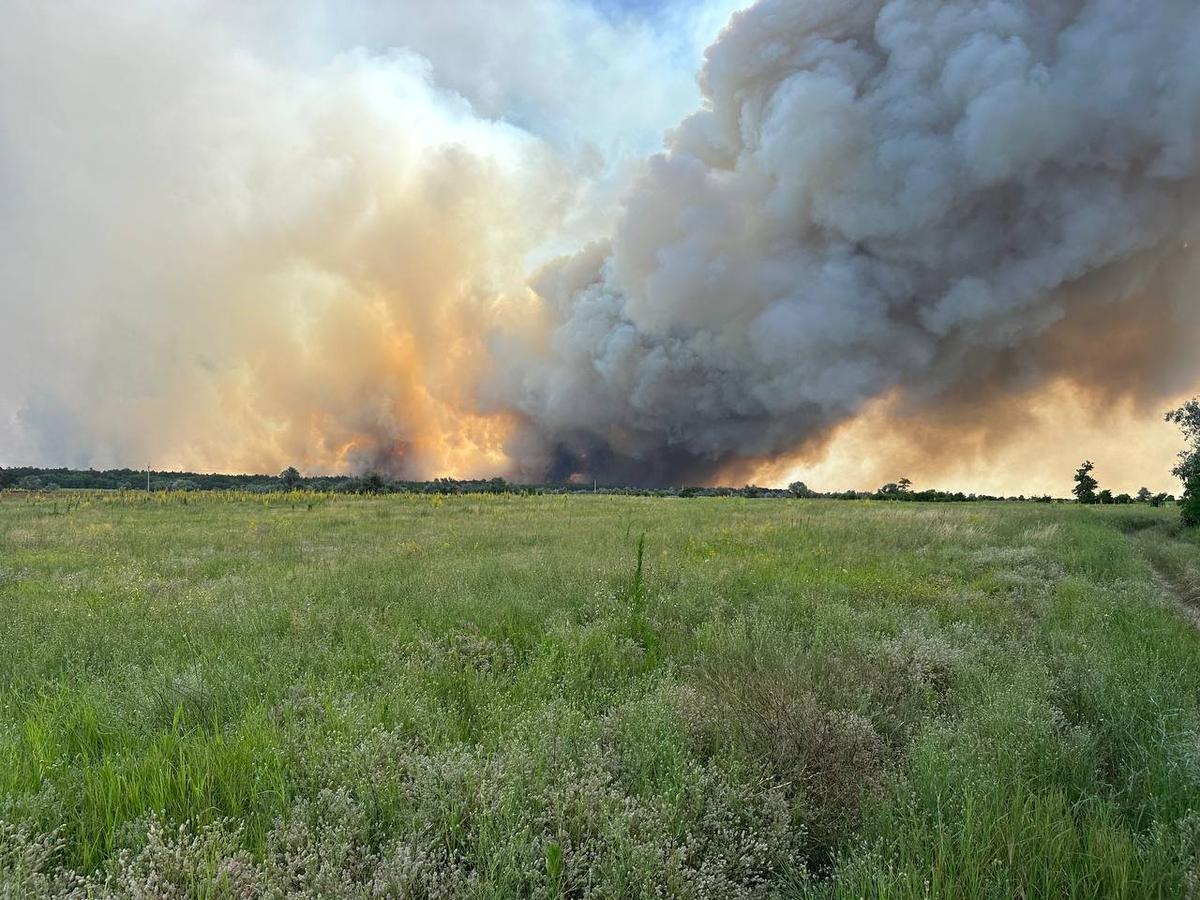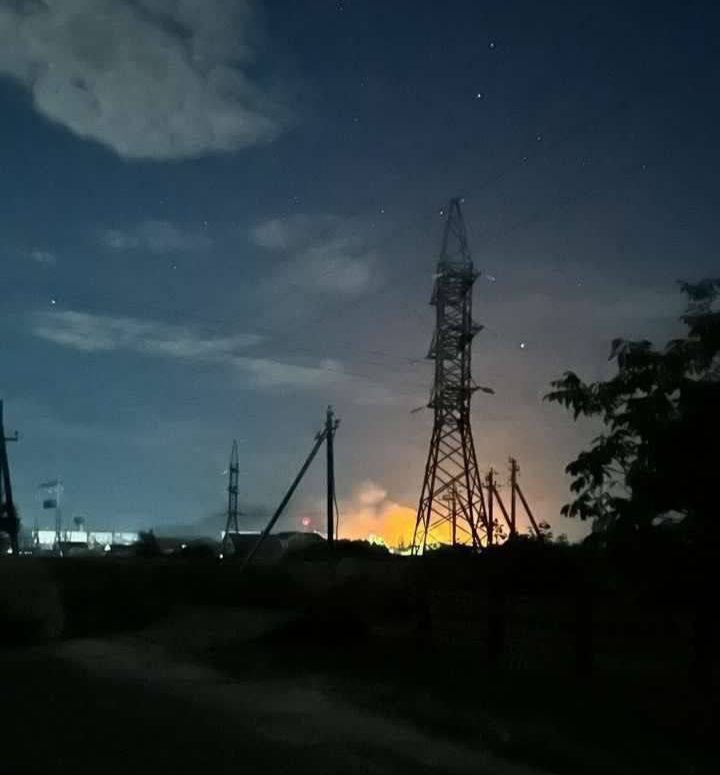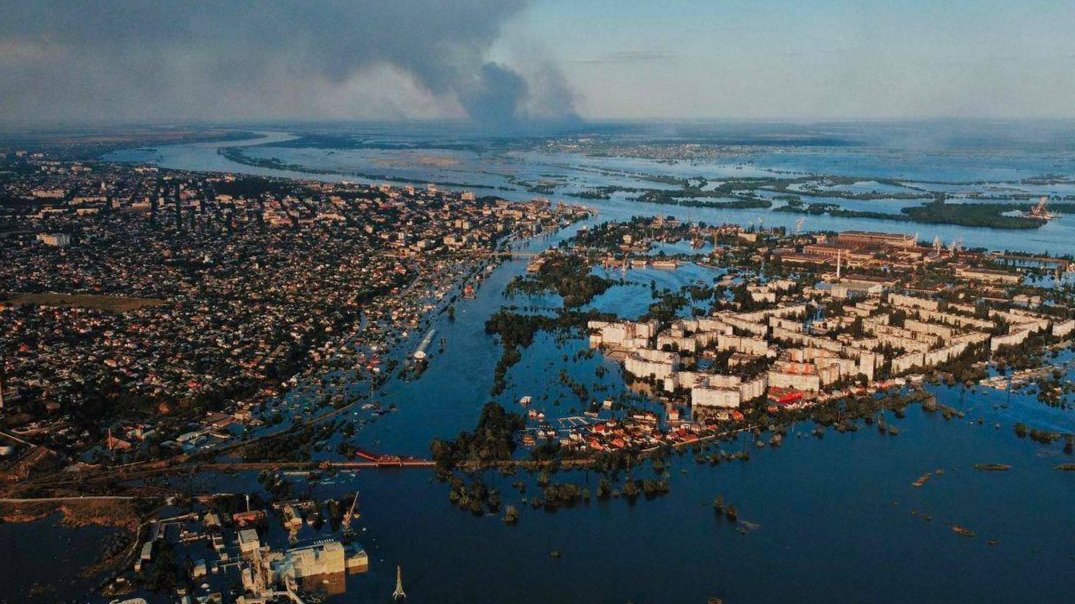‘I’m tired of seeing elders crying’
Natalia, 44, Hola Prystan (occupied by Russia)
“Me and my children do not have a home anymore. It’s just a pile of rubbish now: the walls were washed away, so the house collapsed. My friends told us we could stay in their empty apartment in Kherson. But how do we get there? An air balloon would be the only option.
Kherson has never been so far away from us. Russians did not bomb us, but they flooded us. Folks like me will manage somehow; we are still of the working age. But what are the elders to do? I’m tired of seeing them cry. It rips my heart apart. Many of them used to live alone, and now they’re homeless, too. And there are so many of them.
Our town used to be a well-off one, and now only about 20% of it is left standing. Many streets are still flooded. I recently visited my parents’ house: the water line there is waist-high, and it was completely underwater at some point. If you move around the town by car or boat, it’s collapsed buildings all around. Some of the houses have their walls still standing, but all the items and furniture inside are unusable anyway.
It terrifies me to think of the old people who lost their lives; very few were rescued. We don’t know how many of them drowned. I don’t know if we ever find that out.
The only thing I managed to grab when the water level was rising was my papers and some cash, and I grabbed some clothes for my children as well. Didn’t have time to take any of my own clothes.
But what hurts the most is that I don’t have any photos with me anymore, the Russians sort of reset my entire past. No photos of me as a child, no photos of my parents, nothing. I managed to pick up my computer from the mud. My only hope is that I’ll find a way to retrieve some photos from its hard drive, at least photos of our kids.
We now live in a village not far from town; some acquaintances of ours took us in. Once every few days I travel back to Hola Prystan. The ruins of my house are still flooded, but some parts of my backyard are already dry. So, I dig through mud and piles of rubbish and try to find some of my belongings there. Yesterday I managed to dig up two 1-litre bottles of sunflower oil, luckily those were sealed up. Sometimes I find canned food, too. Many people do so as well: they return to their backyards to search for things in the rubbish. What else are we supposed to do? Few can afford buying new things. A kettle, a fridge, a washing machine: people need to find money in order to buy those.
The Russians promise to compensate everyone affected by the flood: the payout is 10,000 rubles [around €100]. I filed my application. At least they’ll compensate me for some part of what I lost because of them. And they’re going to have less money for ammo to use against us. But this sum is next to nothing, of course. To get more, you must agree to become a Russian citizen. I don’t want to do that.

A forest near Hola Prystan after shelling. Photo: Telegram
We’re all like zombies here. It’s impossible to fall asleep as thoughts are swirling round my brain on how to live on. And the images of the destroyed town and the people in tears, too. But I can’t let myself cry as children and elders look up to me. We spent several days in our relatives’ attic when the water level was the highest. At night, when we weren’t under attack, we heard neighbouring houses collapsing. I went cold with fear. I was looking at my children, sitting on a pile of blankets and other people’s items, and I was praying to God, afraid that the house might collapse just like the other ones.
Of course, I knew that the Russian troops are morons, but I never expected them to cause such a disaster and drown so many people at once. I think to myself all the time: what have we done to Russians that they treat us this way? I don’t get the reason. Why is it all happening? For the sake of what?
‘I can’t get used to young people dying’
Vera, 79, retired, Kherson (liberated by Ukraine)
“I don’t want to complain but I feel really bad, I am becoming so weak with each day now. I feel the same way as last autumn when I had a stroke. I’m trying to think positive, but it looks like my body is surrendering due to non-stop stress. The house I spent half of my lifetime in was flooded. The water level did not reach my floor, but my apartment, just like the one of my neighbours, is all covered with mould now.
Everything is destroyed now: all those things I couldn’t part with when my family begged me to leave Kherson, when it was still under occupation.
My house wasn’t destroyed by a shell, but it’s not suitable for living anymore. There is no running water, no gas or power supply. There’s water still on the ground floor and outside. I now live in my daughter’s house as she left the city long ago.
I’m tired of the constant air-raid sirens. I simply cannot leave as I’m feeling too unwell. That’s why I only pray that this place does not get shelled. I think all the time how good it is that my husband died before the war began. I can’t imagine how he would survive this.
Yesterday we buried Yura, my friend’s son. He used to visit me every now and then and bring me groceries. They used to live in another neighbourhood. He was wounded by a mortar fragment during one of the strikes. Yura didn’t die immediately, but he told his mother he couldn’t hold on anymore. His mother, Tania, cried so hard! He was her only child. And I cried with her.
I took a cab to the morgue and bought some flowers for Yura. We weren’t allowed to go to the cemetery, only his mother was allowed. They said that if a group of people gathers in one place these days, the Russians target this place right away.
Tania is in a very bad state, I’ve no idea how she’s going to live after this. She said that she was only allowed to see her son’s face in the coffin for a few seconds.
Everyone was afraid the place would get shelled, so they were in a haste to leave the cemetery.
As I was on my way to the morgue in that cab, I was crying. God, they destroyed our city with strikes... War is war, and there’s no end to it in sight. It would have been over long ago if someone actually wanted to help Ukraine. Nobody cares for our country, and we only get enough support to cripple Russia, but not to defeat it.
Another child of my friends was also laid to rest: Sasha was 40, killed in combat. I can’t get used to young people dying. I have a feeling that this war is going to last much longer and kill many more children of ours. Tania said as she cried after the funeral: “You can’t imagine how many crosses with flags [graves of servicemen] there are, the graveyard is so much bigger now.”
My friends and family keep calling me every now and then, but nobody is in good spirits: it’s all tears.

Kherson. Photo: Telegram
‘The Russians attack areas where people gather’
Yevhen, 45, businessman, Kherson (liberated by Ukraine)
“My wife, me, and our son have decided to leave Kherson. We’ve already bought ourselves train tickets. We’ll move to Transcarpathia, far from the missile strikes. This is where you can rent a house with all the furniture and appliances, and then buy it out. Many people there moved abroad in the early days of war and abandoned their houses. We have no belongings left: everything was destroyed by the flood. Our house stood strong, but collapsed on the third day.
Hey, wait up... One, two, three... Eight seconds. Must be three kilometres away from here (a rumble and then a boom of explosion is heard in the distance, followed by another one). I wanted to apply for a payout at first, but there are so many people applying right now who suffered [the flood], so I decided to put this off. Although only about 20% of the population are still in Kherson compared to pre-war times, and the streets are deserted, many people start queueing up anyway. The most dangerous thing about those queues is that you may get killed by a shell. The Russians attack areas where people gather.
I lost my business as well. A high-explosive shell hit my facility, and all the commodities and equipment were destroyed by the fire. So, nothing prevents me from leaving Kherson. I’ll have to start my life over in a new place.
Support independent journalism
‘I was one of the first to receive a Russian passport in Hola Prystan’
Iryna, 53, unemployed, Hola Prystan / Skadovsk (occupied by Russia)
“Everything’s fine here. Skadovsk is a lovely town, there are free concerts every now and then, and the roads are being repaired. I really like it here, we often go for a walk by the sea side. There are crowds of people here: we have a café and a water park open to visitors.
We rented an apartment here from our friends who left for Europe when the war had started. Well, I mean... We don’t really rent it, we just live here and prevent looters from robbing the place.
Our home was flooded. It did not collapse, but there are now cracks in its walls, and the floor became warped. I’m not sure if it’s going to stay this way or collapse someday. It’s dangerous to live there now anyway. There’s mould everywhere. It’s a shame because we bought new couches right before the war began. We had to throw all the furniture away as it’s ruined now and smells of bog. We moved all our clothes as we left for Skadovsk. Those that we left in our house can no longer be used. I washed them several times and used bleach, too, but they still smell of bog.
I spend my days visiting all sorts of offices, applying for different welfare programmes and humanitarian aid. We have so much grains and canned food now that we can last for six months. We’ve had enough of that buckwheat and canned food, though. I was one of the first people to receive a Russian passport in Hola Prystan, so I have no trouble getting all that money.
Recently we bought a foreign brand car for 600,000 [most likely rubles, €6,000]. We collected that money using all sorts of indemnity opportunities. Our goal now is to receive a real estate certificate and buy an apartment in Crimea or the Krasnodar region. Although we don’t want to move far from our former house, just in case it might get confiscated. We moved to Skadovsk early this year, but also received all the benefits for those who suffered from the flood. We told the authorities that we only just moved because our house was flooded and we lost all our belongings. The requirement was to bring two people who could prove this, but we simply made a deal with our friends.
We are now waiting for the Russians to add all the abandoned houses and apartments to their register so that we could become the official owners of the flat. I don’t think the former owners are ever coming back because Skadovsk is Russia. What do you mean for now it is? I’m sure this is going to be this way forever.
Join us in rebuilding Novaya Gazeta Europe
The Russian government has banned independent media. We were forced to leave our country in order to keep doing our job, telling our readers about what is going on Russia, Ukraine and Europe.
We will continue fighting against warfare and dictatorship. We believe that freedom of speech is the most efficient antidote against tyranny. Support us financially to help us fight for peace and freedom.
By clicking the Support button, you agree to the processing of your personal data.
To cancel a regular donation, please write to [email protected]

